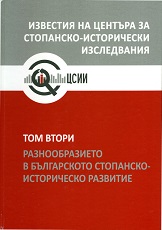Ролята на държавните банки в икономиката на България в периода между двете световни войни (моделът на българската икономика през 30-те години на ХХ век)
The Role of State-Owned Banks in the Economic Life of Bulgaria in the Period between the Two World Wars (The model of the Bulgarian economy in the 30s of the twentieth century)
Author(s): Marco DimitrovSubject(s): History, Economy, National Economy, Economic history, Recent History (1900 till today), Financial Markets
Published by: Център за стопанско-исторически изследвания
Keywords: history of banks; national banks; economic history of Bulgaria; economic of 30s of the twentieth century; managed economy; regulated economy; state and economy; institutions
Summary/Abstract: The main idea of of this text is to show the degree of participation of the major state-owned banks, the Bulgarian National Bank, the Bulgarian Agricultural and Cooperative Bank (until 1934 Bulgarian Agricultural Bank), the Bulgarian Central Cooperative Bank (until 1934) in the economic development of Bulgaria during the interwar period (1919-1939), as well as their role in the formation and implementation of the state economic policy. The aim is to define more precisely the nature and content of this policy and the type of economy that is imposed in the country in the 1930s.
Journal: Известия на Центъра за стопанско-исторически изследвания
- Issue Year: II/2017
- Issue No: 1
- Page Range: 192-213
- Page Count: 22
- Language: Bulgarian

